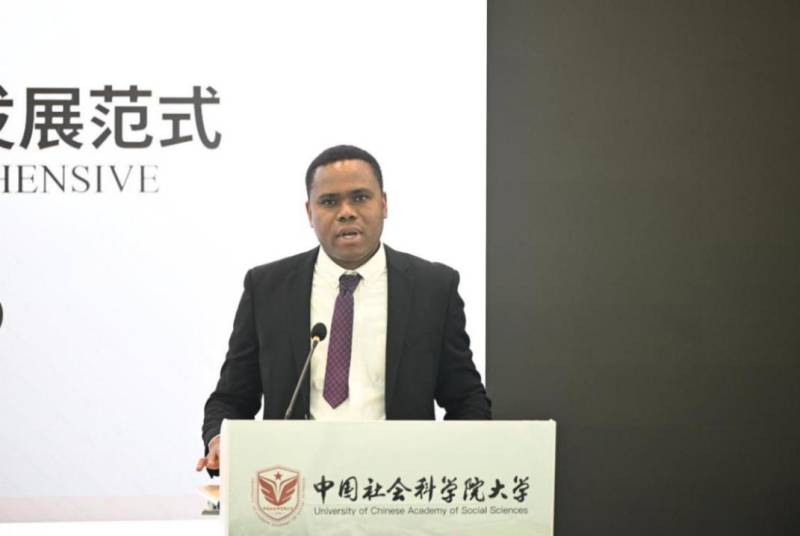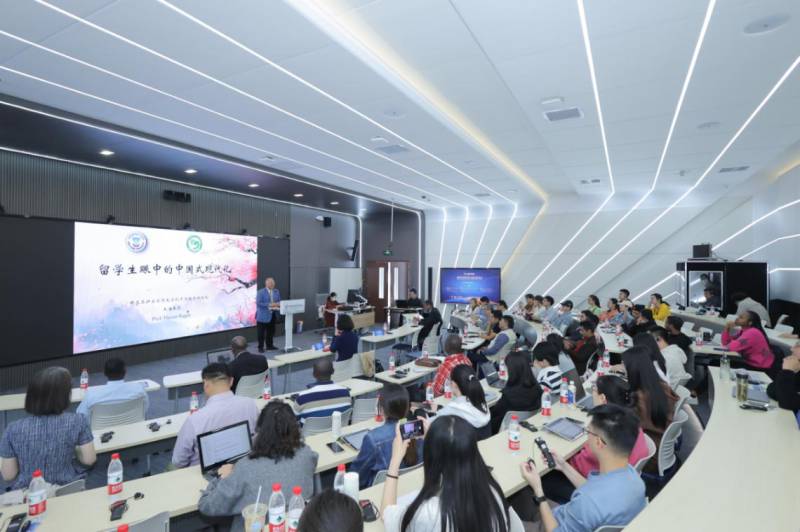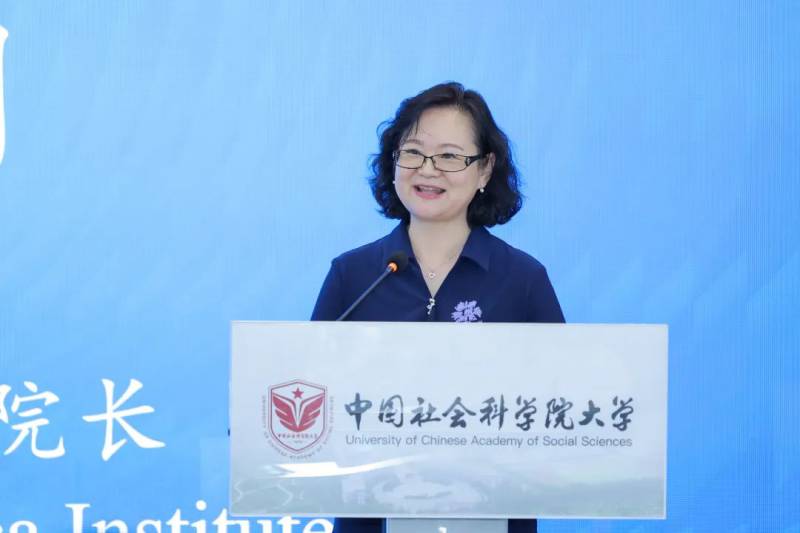The 18th Africa Lecture held by CAI

The 18th Africa Lecture was held at Liangxiang Campus of the University of Chinese Academy of Social Sciences (UCASS) by China-Africa Institute (CAI) on April 16, 2024, under the theme of "Chinese Modernization in the Eyes of International Students".
The lectures were given by Professor Hassan Ragab, a renowned Egyptian Sinologist and Director of the Confucius Institute at the Suez Canal University in Egypt; Moumouni Guillaume, Director of International Cooperation, Public Relationship and Concierge Department of School of Political and Juristic Sciences, University of Abomey-Calavi in Benin; and Gohi Bi Foua Claude Alain, Associate Professor at School of Biological and Chemical Engineering and School of Foreign Languages, Panzhihua University.
Professor Wang Xiaoming, Vice President of the CAI presided over the lecture. More than 50 Chinese and foreign scholars and students from UCASS and other universities and research institutions attended the lecture.

Hassan Ragab is delivering speech
Professor Hassan Ragab focused his speech on his studying experience in China, the advantages and challenges of Chinese modernization. He said, he fell in love with Chinese history ever since he was a child, because both Egypt and China are ancient civilizations that have made great contributions to the development of human civilization. After graduating from high school, he decided to learn Chinese language, and he was one of the first Egyptians to learn Chinese. Professor Hassan Ragab came to China in 1986 and studied at Peking University. Since the beginning of the new century, China has witnessed rapid development in various fields, and the great achievements came from the hard work of hundreds of millions of Chinese people under the leadership of the Communist Party of China (CPC). He said that Chinese modernization is an important inspiration for Egypt, however, for many Egyptians little is known about China, therefore his mission was to act as a bridge to bring closer China-Egypt relations.
Prof. Hassan Ragab believes that Chinese modernization is different from the traditional model of Western modernization. China formed a unique path of modernization by drawing lessons from Western modernization, and integrating with its own national conditions and traditional culture. Chinese modernization excelled in many aspects, such as integrating government-leading development with market regulation, adopting the strategy of sustainable development, building strong national force and human capital, practicing the concept of collectivism and promoting infrastructure construction. In addition, Prof. Hassan Ragab said that it remains a challenging task for the world to understand and present stories of Chinese modernization. He said, in this regard the story of Chinese modernization could be told internationally via various media platforms, by strengthening cultural and people-to-people exchanges, promoting international aid and cooperation as well as strengthening education and talent training.

Moumouni Guillaume is delivering speech
Moumouni Guillaume underlined his understanding of Chinese modernization with examples of China’s landmarks and Chinese leaders. He said, the multiculturalism and time-honoured history of the Forbidden City represents China’s splendid culture and political traditions; the Great Wall represents the wisdom of the Chinese people and its advanced science and technology; and the three generations of Chinese leaders represent the different developmental stages of Chinese modernization.
Mao Zedong, the founder of New China, successfully coped with the complex and difficult situation of the time with the spirit of self-improvement and patriotism. Deng Xiaoping is known as the “chief architect” for China's reform and opening-up policy, the policy and his thought on socialism in the new era are of great significance. Chinese president Xi Jinping did not only fulfilled the expectations of Mao Zedong and Deng Xiaoping for China's development, but has also led the Chinese people to strive towards the Two Centenary Goals.
Moumouni pointed out that Chinese traditional culture and the concept of socialism with Chinese characteristics have laid an important cultural and ideological foundation for Chinese modernization, which has set an example for Africa nations and many other developing countries. Many African governments failed to make good development plans due to political rivalry between parties. On the contrast, the CPC has forged the implementation of many major projects with solidarity, strong capacity and far-reaching vision. This is one of the major advantages of Chinese modernization, and African countries should learn from China.

Gohi Bi Foua Claude Alain is delivering speech
Gohi Bi Foua Claude Alain delivered a speech titled “Chinese modernization: a new comprehensive development paradigm”. He stressed the importance of understanding the connotation of Chinese modernization: Chinese modernization is a socialist modernization led by the CPC. It shares some commonalities of modernization with other countries, but with Chinese characteristics that is based on its own national conditions. Chinese modernization is a new comprehensive development paradigm, mainly reflected in sectors such as economic, society, ecology, culture and national governance system and governance capacity.
He noted that with unique advantages, Chinese modernization is fundamentally different from that of Western countries. Firstly, it is led by the CPC, which helps to ensure the stability and sustainability in the course of modernization, gather strength of all ethnic groups towards one goal, and avoid any instability caused by frequent policy change. Secondly, Chinese modernization is always based on China’s national conditions, taking full consideration of its history, traditions, culture foundation and social structure to form a development path that suits its own national conditions. Thirdly, Chinese modernization is in pursuit of omprehensive development of the economy, politics, culture, society and ecology. It pays close attention to both material improvement and cultural and ethical progress. This comprehensive and coordinated development model will help to build a harmonious society and all-round development of the individual.
Finally, Chinese modernization upholds the principle of putting people first, and always prioritizes the interests of the people with the goal to improve the living standards of the people, to promote social fairness and justice, and to achieve common prosperity for all. He stressed that the comprehensive development paradigm of Chinese modernization is of great significance for China-Africa relations. It provides new perspectives and paths for China-Africa cooperation and contributes to the sustainable development of China-Africa cooperation.

Participants at the lecture
In the Q & A session, international students from UCASS and Chinese teachers and students had an in-depth exchanges with the three speakers on technology transfer, traditional culture, international discourse and other topics.

Prof. Wang Xiaoming is making concluding speech
Prof. Wang Xiaoming said in her concluding speech, the three speakers talked about Chinese modernization in their eyes with their own experiences, which is really inspiring. The success of Chinese modernization did not come overnight, it is achieved by all Chinese people through persistent and painstaking work under the leadership of the CPC. Based on their own national conditions, African countries have drawn some lessons from the experience of Chinese modernization, one thing they adopted from the Chinese people is the spirit of hard-working and perseverance. Prof. Wang encouraged Chinese students to learn foreign languages, especially African native languages, while carrying forward China’s traditional culture, in order to make greater contributions to China-Africa communication and cooperation.
(Photograph Courtesy of UCASS)


